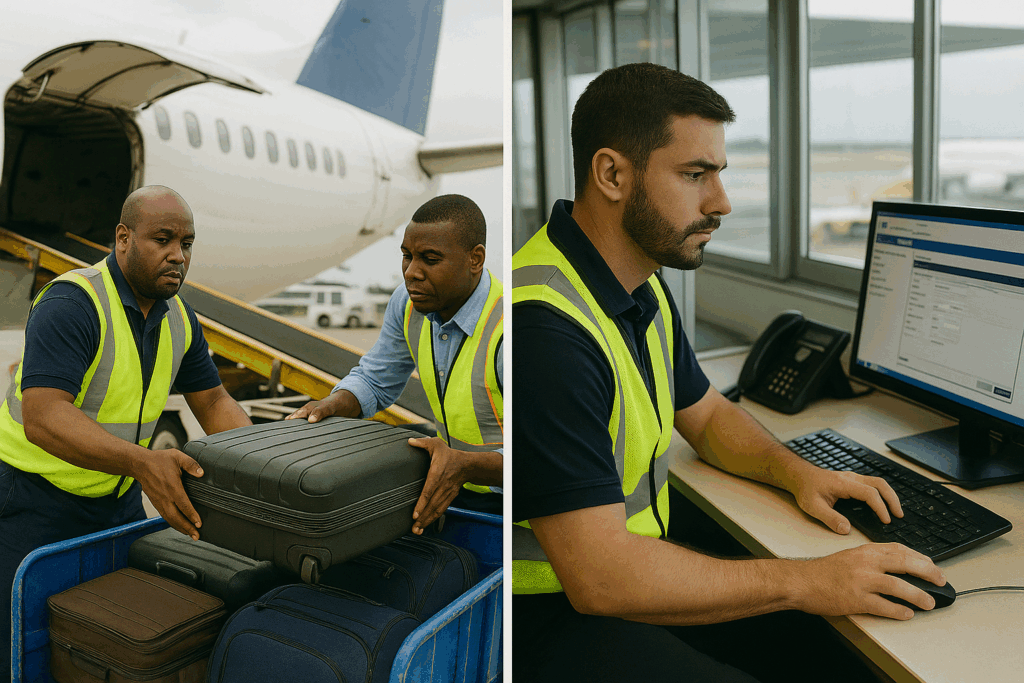Africa’s largest carriers move tens of millions of passengers and their luggage each year. According to OAG/AFRAA data (via BusinessInsider), the top 10 African airlines (by passenger traffic) are Ethiopian Airlines, EgyptAir, Air Algerie, Safair, Royal Air Maroc, Airlink, Kenya Airways, Air Cairo, Air Peace, and Tunisair (africa.businessinsider.com). For example, Ethiopian carried ~11.3 million passengers in 2023 (afraa.org). Assuming the industry average of 1.2 checked bags per passenger (sita.aero), that implies Ethiopian handled roughly 13.6 million bags that year. Similarly, EgyptAir (~8.2M pax), Safair (~6.6M), Royal Air Maroc (~5.7M) and Air Algerie (~4.7M) each uplift millions of bags annually (afraa.orgsita.aero). (Smaller carriers like Airlink, Kenya, Air Peace and Tunisair uplift fewer bags but still millions per year.) These massive volumes set the stage for the region’s baggage operations and underscore why small mishandling rates translate into very large absolute numbers of lost or delayed bags.
Global vs. regional benchmarks: The global mishandled-baggage rate soared to about 7.6 bags per 1,000 passengers in 2022 (theaviatorsafrica.com) (versus 4.35 in 2021) as traffic rebounded. By 2023 SITA reported some recovery, with rates falling toward 6.9 per 1,000. (Over a decade the rate has declined ~63% from ~19 per 1,000 to <7 (sita.aero.) Regions vary widely – for example, Asia-Pacific’s rate (~2–3) is far below the USA/Europe (~9–10 per 1,000) (sita.aero) – but Africa’s specific figure is not published. With only 27% of African carriers fully tracking bags as of 2024 (worldairnews.co.za) (versus ~88% in North Asia (worldairnews.co.za), Africa likely hovers near the global average or higher. If Ethiopian’s ~13.6M bags faced a 7.6/1,000 mishandle rate, that would be ~103,000 bags mishandled in a year. In practice, most mishandled bags (>75%) are delayed (not permanently lost) (sita.aero); only ~5% (globally) are totally lost or stolen (sita.aero).
- Mishandled baggage metrics: Industry sources track mishandled bags per 1,000 passengers. Globally this was ~7.6/1,000 in 2022 (theaviatorsafrica.com). African carriers have not published their own rates, but must be compared against this benchmark. (For context, in Europe/US the baseline is roughly 8–10/1,000, while Asia’s is much lower (sita.aero.) If African airlines were at the global norm, every 100,000 passengers would see on the order of 700–800 mishandled bags. Higher-volume carriers (Ethiopian, EgyptAir, etc.) likely handle well over 100,000 mishandled bags annually, mostly due to delays on connecting flights. (sita.aero)
- Delays and disruptions: Baggage issues also cause flight delays. EUROCONTROL data show that “airline delays (such as passenger and baggage handling)” add about 4.5 minutes of delay per flight on average (eurocontrol.int). In practical terms, if bags arrive late on a flight, loading takes longer or crews must wait, pushing back departure. African airlines do not publicly break out delay minutes by cause, but baggage handling (especially mishandling or late loading) is a known factor. Improving baggage processes (scans, staffing, equipment) is therefore a way to shave minutes off delays and improve on-time performance.
- Connecting (transfer) vs. origin (local) baggage: Global data reveal that nearly 50% of all baggage mishandling occurs on connecting flights (sita.aero). International itineraries (with transfers) are ~5 times more likely to lose a bag than purely domestic trips (sita.aero). In practice this means connecting baggage – bags checked through from one flight to another – represent the bulk of trouble. For example, Ethiopian and EgyptAir (with many trans-African and intercontinental transfers) will have more transfer baggage issues, whereas Safair (predominantly domestic South Africa) deals mainly with local origin/destination bags. Overall, half of mishandled bags worldwide happen during transfers (sita.aero), so African airlines with major hubs (e.g. Addis, Cairo, Casablanca) must manage high connecting-bag volumes. By contrast, carriers with mostly local traffic see a smaller share of transfer mishandles.
- Central baggage tracing: All major African airlines maintain a formal baggage tracing office (sometimes called a Central Baggage Tracing unit). For example, Kenya Airways advertises “Central Baggage Tracing Controllers” on its careers page (myjobmag.co.ke), reflecting a dedicated team to track and reunite lost bags. Ethiopian Airlines (Star Alliance member) and EgyptAir also provide 24/7 baggage tracking via IATA’s WorldTracer system; Royal Air Maroc (Oneworld) similarly supports WorldTracer tracking for delayed bags (royalairmaroc.com). In general, IATA requires each carrier to have a lost-baggage office as part of global baggage standards. The top African carriers – especially alliance members like Ethiopian, EgyptAir, Kenya, RAM – all operate such centers. (Smaller or low-cost carriers like Safair also have lost-bag offices, though often scaled to their size.) Passengers can file IRROPs (Irregularity Reports) with any of these airlines’ tracing offices to initiate the search.
Together, these data show African carriers manage enormous baggage volumes with performance roughly in line with the global industry: millions of bags uplifted, on the order of 6–8 mishandled per 1,000 passengers (theaviatorsafrica.com). The sector is working to improve – with digitization and better tracking – but still lags top-performing regions. Compared to global benchmarks (6–7 per 1,000) and the industry push for fewer than 5 per 1,000, Africa’s leading airlines have room to reduce mishandling further. They do so by investing in technology (tracking apps, automated bag drops) and process rigor, aiming to lower their mishandled-bag rates below the world average.


